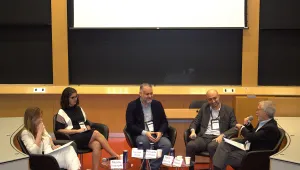BCSIA: 1977-1978 ANNUAL REPORT
4. Seminars
SEMINARS
This year the Program sponsored four series of seminars. The Harvard Arms Control Seminar, the PSIA Visitors Seminar, and the PSIA Research Seminar were continued from previous years. A new seminar series, the Soviet Military Doctrine Seminar (jointly sponsored by the Program, the Russian Research Center and the Center for International Affairs) was held during the Spring term.
Harvard Arms Control Seminar
Twelve Arms Control Seminars were conducted this year before audiences ranging in size from 50 to 200. Following each seminar, a smaller group of changing composition met for dinner and discussion with the invited speaker.
Speakers and their topics were as follows (Date, Speaker, Subject):
September 28, Spurgeon M. Keeny, Jr., Deputy Director, U.S. Arms Control and Disarmament Agency "Arms Control: Problems and Prospects"
October 5, Louis B. Sohn Bemis Professor of Law, Harvard Law School "National Security and the Law of the Sea"
October 19, Leslie H. Gelb Director, Bureau of Politico-Military Affairs, Department of State "Control of Conventional Arms Transfers"
November 2, Joseph Nye Deputy Undersecretary of State for Security Assistance, Science and Technology "U.S. Nuclear Nonproliferation Policy"
November 16, Lincoln Bloomfield Professor of Political Science, M.I.T. "Arms Control and the U.N."
November 30, Karl Kaiser Professor of Politics, University of Cologne, Germany (German Kennedy Fellow, Harvard University) "European Security: What Are the Issues?"
February 15, Richard Burt Journalist, New York Times, Washington Bureau "The Debate over SALT: Political and Military Considerations"
February 27, Wassily Leontief Professor of Economics, New York University "The Economic Implications of the Limitation of military Expenditures, Particularly in Respect to Developmental Aid and International Trade"
March 15, Iqbal Akhund The Permanent Representative of Pakistan to the U.N. "The Forthcoming Special Session of the General Assembly on Disarmament and New Approaches to Nuclear Arms Control"
May 3, Alvin Weinberg Director, Institute for Energy Analysis, Oak Ridge, Tennessee "How Can We Make Nuclear Energy Acceptable?"
May 8, John C. Culver United States Senator from Iowa "A Congressional Perspective on Arms
Control"
May 10, McGeorge Bundy President, The Ford Foundation "Bombs at Bay, or the Dog that Has Not Barked So Par: Reflections on the Avoidance of Nuclear War Since 1945"
Soviet Military Doctrine Seminar
The Program co-sponsored the Soviet Military Doctrine Seminar with the Center for International Affairs and the Russian Research Center. Eight sessions were held at which visiting experts presented papers on various aspects of Soviet military doctrine. Each session was followed by a dinner with attendance limited to 20-30 invited guests with special interest in the field to allow for intensive discussion and debate. The Seminar was chaired by Professor Paul Doty representing the Program, Professor Richard Pipes of the Russian Research Center, and Dr. Daniel Yergin of the Center for International Affairs.
Listed below are the speakers and their topics.
February 13, Arnold L. Horelick, CIA Benjamin Lambeth, RAND Corporation "Soviet Strategic Doctrine"
March 1, Joseph Douglass, System Planning Corporation Richard Head, Council on Foreign Relations "Soviet Theater Doctrine"
March 6, Michael MccGwire, Dalhousie University Barry Blechman, Arms Control and
Disarmament Agency John B. Chomeau, CIA "Soviet Naval Doctrine"
March 13, Harriet Scott, Washington Dimitri Simes, Georgetown University "The Making of Soviet Doctrine"
March 20, T.K. Jones, Boeing Corporation William Kincade, Arms Control Association "Relation of Soviet Civil Defense to Doctrine"
April 10, Ernest May, Harvard John Steinbruner, Yale "Responsiveness of Soviet Doctrine to Changes in U.S. Doctrine, Capabilities, and Deployments"
April 17, Daniel Graham, University of Miami, Washington William Hyland, Washington
Peer Lange, Ebenhausen, Germany Robert Legvold, Tufts University William Odom, National Security Council, Washington "Relation of Soviet Military Doctrine to Political Objectives"
May 1, Fritz Ermarth, RAND Corporation William Kaufmann, M.I.T. "Comparison of Soviet and U.S. Nuclear Doctrine"
Visitors Seminar
Participation in the Program''s Visitors Seminar normally was limited to 20-30 individuals, thereby providing a forum suitable for in-depth discussions with the visiting experts. Twenty-eight seminars were held this year.
Speakers and their topics appear below.
September 28, Bernard Feld, Professor of Physics, M.I.T. "The Recent Pugwash Conference in Munich"
October 3, Christoph Bertram, Director, International Institute for Strategic Studies "Arms Control and Technological Change"
October 5, Irene Errera, Researcher, National Center of Scientific Research (CNRS), Paris, France "Arms Exportation as a Means of French Foreign Policy in the Middle East"
October 12, Anne Cahn, Head, International Social Impact Section, U.S. Arms Control and Disarmament Agency "Arms Transfers, NATO Standardization and Technology Transfer: A Typical Policy Conundrum"
October 17, Amory Lovins, Member, Friends of the Earth, London, England "Soft Energy Technology: The Answer to Non-proliferation?"
November 9, Bernard Weinraub, Journalist, The New York Times "Perceptions of a Journalist Covering the Pentagon"
Shimon Peres, Labour Party Leader, former Israeli Defense Minister Discussion of current Israeli Policies
November 14, Visiting Specialists from the Los Alamos Scientific Laboratory, Los Alamos, New Mexico: Dr. Harry Hoyt, Assistant Director for Weapons Planning and Coordination; Mr. Edward Chapin, Director of Systems Analysis; Mr. Robert Sandoval, Senior Defense Analyst;
Mr. Robert Helm, Senior Defense Analyst. "Nuclear Arms Control"
November 16, Christoph Hohenemser, Professor of Physics and Director, Program on Technology and Man, Clark University Roger E. Kasperson, Professor of Government and Geography, Clark University "The Distrust of Nuclear Power"
November 21, Jorma Miettinen, Professor of Radiochemistry, University of Helsinki "Tactical Nuclear Weapons in Europe and Their Role in the Global Military Balance"
November 28, Helga Haftendorn, Visiting Professor, Georgetown University (On leave from the University of the Armed Forces, Hamburg, Germany) "The Nuclear Triangle: Bonn-Brasilia-Washington"
December 5, Jack Ruina, Professor of Nuclear Engineering, M.I.T. "Obstacles to a Comprehensive Test Ban"
December 12, Henning Gottlieb, Foreign Affairs Advisor to the Danish Prime Minister "Nordic Security"
February 1, Jerome Cohen, Professor and Associate Dean, Harvard Law School "Recent Impressions of East Asia"
February 6, Bernard O''Keefe, President, E.G. & G., Wellesley "Energy and the Economy"
February 21, Jean Pierre Contzen, Director, Joint Research Programs, Commission of the European Communities "An Exchange of Views on Research Management, Evaluation of R & D Results, R & D Programming and Management Aspects"
March 1, Albert J. Meyer, Professor of Middle Eastern Studies, Harvard University "Recent Developments in Saudi Arabia"
March 8, Daniel Bell, Professor of Sociology, Harvard University "Communications"
March 13, Thomas Halsted, Public Affairs Advisor, United States Arms Control and Disarmament Agency "The Politics of Arms Control"
March 17, Ashraf Ghorbal, Egyptian Ambassador to the United Nations "Current Issues in Middle East Peacemaking"
March 20, Herbert York, Professor of Physics, University of California at San Diego and Consultant to the Secretary of Defense "Work in Progress"
Gregory Treverton, Staff Member, National Security Council "SALT and the Europeans"
March 22, Samuel F. Wells, Jr., Secretary, International Security Studies Program, Woodrow Wilson International Center for Scholars "The Role of Deterrence in American Defense Policy"
Vasilii Kulish, Institute of the Economics of the World Socialist System, Academy of Sciences,
the Soviet Union "Arms Control and Soviet Foreign Policy"
April 10, John Steinbruner, Professor, Yale University School of organization and Management
"Operational Force Arms Control"
May 1, Arthur Alexander, RAND Corporation "Organization and Decision-Making Processes
in Soviet Weapons Procurement (From the Design Bureaus to the Politburo)"
May 3, P.R. Chari, Director, The Institute for Defense Studies and Analyses, New Delhi, India
"The Nuclear Situation in South Asia"
May 9, Kmaran Tnan, Senator from Turkey and Former Minister of Energy "Turkish Foreign Policy and Turkish-U.S. Relations"
Research Seminar
The Research Seminar Series provided the opportunity for members of the Program''s research staff to obtain their colleagues'' reactions to research in progress. To facilitate the free flow of ideas, these seminars were informal and off-the-record, and attendance was limited to members of the staff, members of the Advisory Committee, and other individuals invited by the speaker.
The schedule of speakers and their topics appears below.
October 26, David Tarr "Toward a Defensive Posture: A Conceptual Analysis"
December 14 Randall Forsberg "The Structure of U.S. Defense Spending"
February 15 Jane Sharp "The Feasibility of National Initiatives in Disarmament: Proposals for U.S. Action at the United Nations Special Session on Disarmament"
March 6, David Deese Frederick Williams "Nuclear Nonproliferation and the International Management of Spent Reactor Fuel"
March 15, Jonathan Pollack "China in Transition: Domestic Politics, National Security and Arms Control in the Post-Mao Era"
March 29, Paul Walker Randall Forsberg "Winding Down: A Reasoned Defense Policy for the 1980s" (their forthcoming book for New York Times)
April 5, Alex Vardamis "Some Joint Security Considerations of the U.S. and F.R.G."
April 19, Michael Mandelbaum "In Defense of Arms Control"
April 26, Onkar Marwah "Nuclear Technology Suppliers, Recipients, and the International System"
May 10, Robert Metzger "Forging On Through the Murk: Arms Control Enters the Grey Area"
May 17, Stephen Larrabee "Regional Security in the Eastern Mediterranean: Problems and Prospects"
Visitors
Many of the visitors to the Program did not deliver formal seminars; however, the importance of their interactions with the Program through informal discussions was considerable nonetheless. The following visitors were among those who engaged in such informal discussions.
November 22, Harlan Cleveland, Director, Program in International Affairs, Aspen Institute for Humanistic Studies
December 12, Makoto Momoi, National Defense College, Tokyo, Japan
January 10, Lord Solly Zuckerman, London
February 3, Ki-tak Lee, Director, Institute for Strategic Studies, Yonsei University, South Korea
February 21, Moshe Arens, Member of Knesset, Israel
February 22, Roger Levien, Director, International Institute for Applied Systems Analysis, Vienna, Austria
February 22, John Maddox, Director, Nuffield Foundation, London
March 3, Oleg Vassilievich Bogdanov, Institute of State & Law of the Academy of Sciences of the USSR
March 28, Russell Peterson, Director, Office of Technology Assessment
April 3, Thomas Watson, President, IBM Corporation
April 3, William Jackson, Chairman, President''s General Advisory Committee on Arms Control and Disarmament
April 4, Carl Walske, President, Atomic Industrial Forum
Table of Contents:
OverviewOrganization and Personnel
Research and PublicationsSeminars Other Program Activities Related Professional Activities Former Members of the Research Staff
The full text of this publication is available in the link below.



